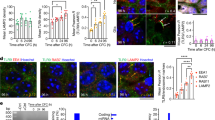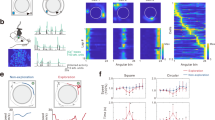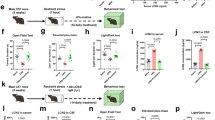Abstract
Extensive evidence from animal and human studies indicates that stress and glucocorticoids influence cognitive function1,2,3,4,5,6,7,8,9,10,11. Previous studies have focused exclusively on glucocorticoid effects on acquisition and long-term storage of newly acquired information. Here we report that stress and glucocorticoids also affect memory retrieval. We show that rats have impaired performance in a water-maze spatial task after being given footshock 30 min before retention testing but are not impaired when footshock is given 2 min or 4 h before testing. These time-dependent effects on retention performance correspond to the circulating corticosterone levels at the time of testing, which suggests that the retention impairment is directly related to increased adrenocortical function. In support of this idea, we find that suppression of corticosterone synthesis with metyrapone blocks the stress-induced retention impairment. In addition, systemic corticosterone administered to non-stressed rats 30 min before retention testing induces dose-dependent retention impairment. The impairing effects of stress and glucocorticoids on retention are not due to disruption of spatial navigation per se. Our results indicate that besides the well described effects of stress and glucocorticoids on acquisition and consolidation processes, glucocorticoids also affect memory retrieval mechanisms.
This is a preview of subscription content, access via your institution
Access options
Subscribe to this journal
Receive 51 print issues and online access
$199.00 per year
only $3.90 per issue
Buy this article
- Purchase on Springer Link
- Instant access to full article PDF
Prices may be subject to local taxes which are calculated during checkout


Similar content being viewed by others
References
Conrad, C. D., Galea, L. A. M., Kuroda, Y. & McEwen, B. S. Chronic stress impairs spatial memory on the Y maze, and this effect is blocked by tianeptine pretreatment. Behav. Neurosci. 110, 1321–1334 (1996).
Kirschbaum, C., Wolf, O. T., May, M., Wippich, W. & Hellhammer, D. H. Stress- and treatment-induced elevations of cortisol levels associated with impaired declarative memory in healthy adults. Life Sci. 58, 1475–1483 (1996).
Luine, V. N., Spencer, R. L. & McEwen, B. S. Effects of chronic corticosterone ingestion on spatial memory performance and hippocampal serotonergic function. Brain Res. 616, 65–70 (1993).
Luine, V., Villegas, M., Martinez, C. & McEwen, B. S. Repeated stress causes reversible impairments of spatial memory performance. Brain Res. 639, 167–170 (1994).
Luine, V., Martinez, C., Villegas, M., Magarinos, A. M. & McEwen, B. S. Restraint stress reversibly enhances spatial memory performance. Physiol. Behav. 59, 27–32 (1996).
Lupien, S. J. & McEwen, B. S. The acute effects of corticosteroids on cognition: integration of animal and human model studies. Brain Res. Rev. 24, 1–27 (1997).
Lupien, S. J.et al. Stress-induced declarative memory impairment in healthy elderly subjects: relationship to cortisol reactivity. J. Clin. Endocrinol. Metabol. 82, 2070–2075 (1997).
Newcomer, J. W., Craft, S., Hershey, T., Askins, K. & Bardgett, M. E. Glucocorticoid-induced impairment in declarative memory performance in adult humans. J. Neurosci. 14, 2047–2053 (1994).
Roozendaal, B. & McGaugh, J. L. Amygdaloid nuclei lesions differentially affect glucocorticoid-induced memory enhancement in an inhibitory avoidance task. Neurobiol. Learn. Memory 65, 1–8 (1996).
Sandi, C., Loscertales, M. & Guaza, C. Experience-dependent facilitating effect of corticosterone on spatial memory formation in the water maze. Eur. J. Neurosci. 9, 637–642 (1997).
Shors, T. J., Weiss, C. & Thompson, R. F. Stress-induced facilitation of classical conditioning. Science 257, 537–539 (1992).
Morris, R. Developments of a water-maze procedure for studying spatial learning in the rat. J. Neurosci. Meth. 11, 47–60 (1984).
De Boer, S. F., Koopmans, S. J., Slangen, J. L. & Van der Gugten, J. Plasma catecholamine, corticosterone and glucose responses to repeated stress in rats: Effects of interstressor interval length. Physiol. Behav. 47, 1117–1124 (1990).
Roozendaal, B., Bohus, B. & McGaugh, J. L. Dose-dependent suppression of adrenocortical activity with metyrapone: Effects on emotion and memory. Psychoneuroendocrinol. 21, 681–693 (1996).
Oitzl, M. S. & De Kloet, E. R. Selective corticosteroid antagonists modulate specific aspects of spatial orientation learning. Behav. Neurosci. 106, 62–71 (1992).
McEwen, B. S. Glucocorticoid-biogenic amine interactions in relation to mood and behavior. Horm. Behav. 28, 396–405 (1994).
De Kloet, E. R. Brain corticosteroid receptor balance and homeostatic control. Front. Neuroendocrinol. 12, 955–164 (1991).
Joëls, M., Karst, H., Hesen, W. & Wadman, W. J. in Brain Corticosteroid Receptors(eds De Kloet, E. R., Azmitia, E. C. & Landfield, P. W.) 166–177 (Ann. NY Acad. Sci. 746, (1994)).
Thomas, D. N., Post, R. M. & Pert, A. in Brain Corticosteroid Receptors(eds De Kloet, E. R., Azmitia, E. C. & Landfield, P. W.) 467–469 (Ann. NY Acad. Sci. 746, (1994)).
Orchinik, M., Moore, F. L. & Rose, J. D. in Brain Corticosteroid Receptors(eds De Kloet, E. R., Azmitia, E. C. & Landfield, P. W.) 101–114 (Ann. NY Acad. Sci. 746, (1994)).
Monk, T. H.et al. Circadian rhythms in human performance and mood under constant conditions. J. Sleep Res. 6, 9–18 (1997).
Acknowledgements
We thank R. M. Sapolsky and S. Brooke for performing the corticosterone assay, and B. Bohus for his comments on an early draft of this paper. The research was supported by a grant from NIMH.
Author information
Authors and Affiliations
Corresponding author
Rights and permissions
About this article
Cite this article
de Quervain, DF., Roozendaal, B. & McGaugh, J. Stress and glucocorticoids impair retrieval of long-term spatial memory. Nature 394, 787–790 (1998). https://doi.org/10.1038/29542
Received:
Accepted:
Issue Date:
DOI: https://doi.org/10.1038/29542
This article is cited by
-
Neurocognitive effects of stress: a metaparadigm perspective
Molecular Psychiatry (2023)
-
Representational formats of human memory traces
Brain Structure and Function (2023)
-
A repeated measures cognitive affective bias test in rats: comparison with forced swim test
Psychopharmacology (2023)
-
Corticotropin-releasing factor induces functional and structural synaptic remodelling in acute stress
Translational Psychiatry (2021)
-
A role for GABA in the modulation of striatal and hippocampal systems under stress
Communications Biology (2021)
Comments
By submitting a comment you agree to abide by our Terms and Community Guidelines. If you find something abusive or that does not comply with our terms or guidelines please flag it as inappropriate.



